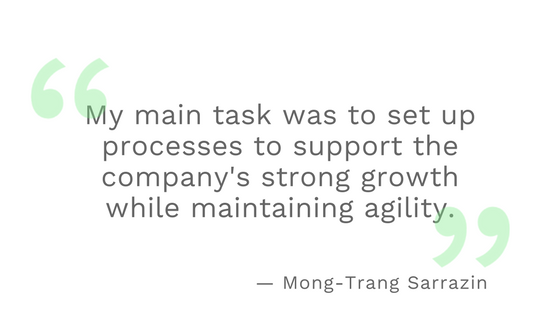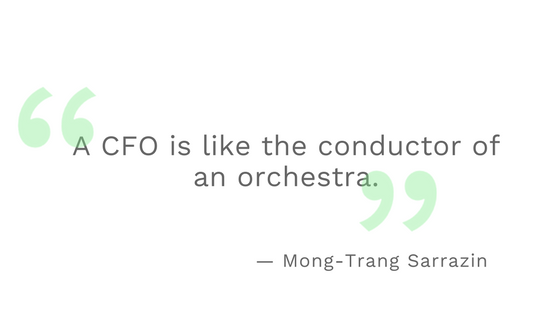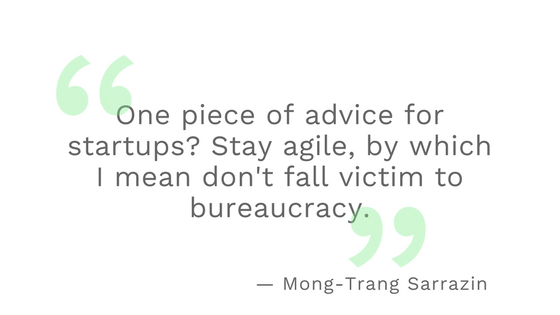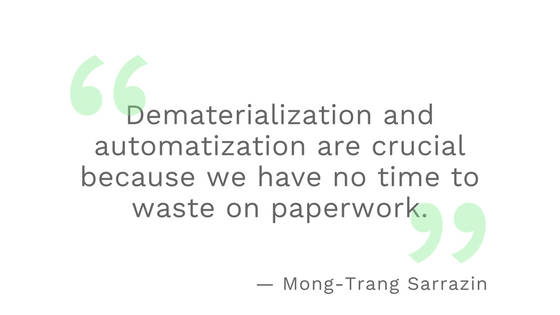Interview with Mong-Trang Sarrazin, CFO at Doctolib
Published on June 27, 2017
)
Mong-Trang kicked off her career with 8 years at Deloitte in Paris and London, where she took care of large TMT (Technology, Media, and Telecom) accounts.
Then she took up the role of CFO at trading software publisher Ullink, where she was responsible for structuring the company and putting financial tools and processes in place. In 2015, French investment fund Kerala Ventures introduced her to Doctolib, Europe's leading online doctor's appointment booking platform. She was as motivated by the entrepreneurial adventure as by the aim of the project: to provide smooth access to care.
Also recognised by her peers, she won the silver trophy in the 5th edition of DAF Magazine's 2017 CFO Awards.

What are your duties at Doctolib?
"There were only around a hundred employees when I came onboard at Doctolib, with only one working in the finance department. My main task was to structure the department in terms of tools and processes, and also to do everything necessary to support the company's strong growth while maintaining agility!”

“Today I'm in charge of the entire finance department but also support functions such as legal, personnel administration, management controls, invoicing, the IT team (wifi, computers, equipment...) and office management. So my daily challenges involve managing a team of fifteen people and defining the company's financial strategy, in particular concerning fundraising, which I handle directly with the founders.”
Can you tell us about your ongoing projects for 2017-2018?
"I still have quite a lot to do to continue structuring the company because we intend to recruit 150 people in 2017 in France and Germany. I'm working on our international growth strategy with all the challenges that internationalization entails. I'm also setting up an ERP and a HRMS to support expansion.”
 What are the differences you have noticed in working for an SME versus a startup ?
What are the differences you have noticed in working for an SME versus a startup ?
"For me the experience was relatively similar in both settings: I had to build and structure everything from the ground up. However, the goal was not the same. As a startup, Doctolib is characterized by strong growth and determination to conquer the market while also building a real company with a specific culture. A more established SME might have a different goal such as a takeover, as was the case at my previous company. The main difference I notice between Ullink and Doctolib is that I'm surrounded by more junior profiles at Doctolib, the average age is 28!"
What advice would you give CFOs at young startups?
"Firstly, get your documents in order. That might sound simple but it's so important to classify financial documents as though you're a data room. It saves time and reassures investors. For our most recent round of funding, it took me less than one day to gather absolutely all of the necessary documents for the investors.
Secondly, stay agile, by which I mean i don't fall victim to bureaucracy. The key to this is dematerialization. It's essential to go paperless as soon as possible. For example, we dematerialized the contracts we have with health professionals. Similarly, for internal expenditure management, we use an expense notes validation processes and, in the near future, we'll be rolling out our ERP to manage cashflow.”
 What SaaS tools do you use?
What SaaS tools do you use?
"On a daily basis we use:
Zuora for invoicing
Payfit for payroll
Spendesk to take the hassle out of managing the marketing team's online payments
Speaking of tools, there are still many issues that need a solution, I'm thinking in particular of bank guarantees and leasing computer hardware. Dematerialization and automatization are crucial because we have no time to waste on paperwork.”

How do you see the role of CFO and how will it evolve?
"A CFO is like the conductor of an orchestra: the job involves seeing all the flows and harmonizing them. The position is increasingly that of a “Business partner”, because a CFO's role is to support the various departments and above all not to hinder workflow by imposing processes or cumbersome bureaucracy. A CFO is involved in every aspect of the business and that's what I like about the role :-).”

)
)